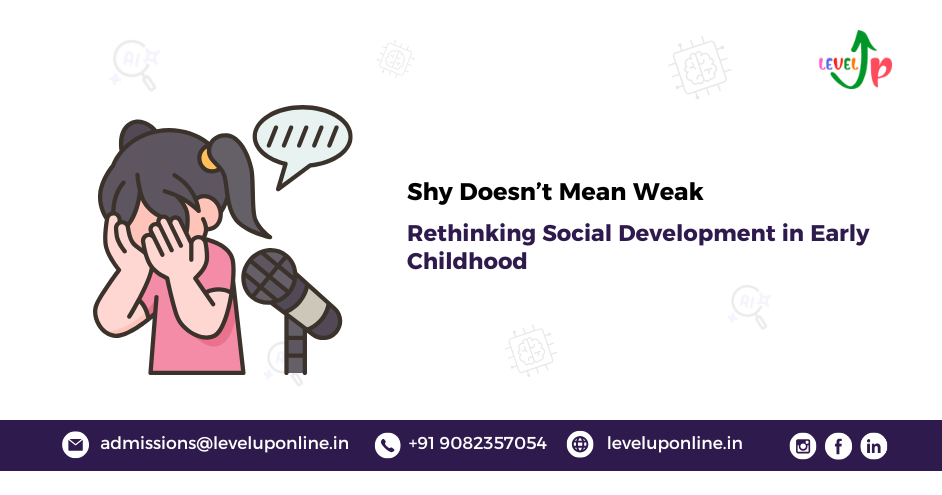Introduction
“She’s just shy.” It’s a sentence whispered with concern, as though shyness is a problem to solve. But in Early Childhood Care and Education (ECCE), especially when we focus on social development, this perspective needs a serious rethink. Children develop in diverse ways—some leap into group play while others watch thoughtfully from the sidelines. This blog explores how ECCE can evolve to embrace all temperaments and how both teachers and parents can deeply support social development in ECCE without forcing children into molds that don’t fit them.
What is ECCE and Why Social Development Matters
ECCE refers to the care, education, and development of children from birth to age 8. One of its most foundational aspects is social development—the ability of children to form meaningful relationships, navigate emotions, and find their place in a social group. But social development in ECCE isn’t a one-size-fits-all journey. Children with quieter temperaments often develop these skills differently, at their own pace, and with a depth often overlooked.
Understanding Shyness in Children
Shyness is not a flaw. It’s a personality trait rooted in temperament and biology. Shy children often take time to warm up to people or situations but are incredibly observant and reflective. Recognizing this distinction is critical for both teachers and parents involved in social development in ECCE.
Instead of asking “How can we make them more outgoing?” we should be asking “How can we support their social confidence in ways that honor who they are?”
The Harmful Myth: Shy Equals Weak
There’s a deep-rooted cultural bias that equates being outspoken with strength and silence with weakness. In ECCE classrooms, children who raise their hands often get praised, while those who don’t are quietly passed over. This sends a message: being loud equals being right. But many shy children are processing ideas deeply—they simply express them differently.
Teachers must realize: expression is not limited to speech. Observation, quiet play, and artistic expression are valid forms of participation.
Teachers: Rethink the Lens of Participation
Let’s pause and reframe what “participation” means in ECCE. Instead of “Who’s the loudest?” ask:
1. Who listens intently?
2. Who makes eye contact and nods?
3. Who shares through drawing, play, or storytelling?
Social development in ECCE must include alternative modes of participation so that every child feels seen.
Real-World Scenario: The Quiet Observer
In a preschool circle, the teacher asks who wants to lead a rhyme. Maya doesn’t raise her hand. She’s labeled as shy. But later, Maya sings that same rhyme at home, with the exact actions. Did she not learn? No—she learned differently.
For teachers, this means documenting how children engage—not just how loudly.
Strategies for Teachers: Nurturing the Shy Child
1. Silent Observation: Watch how shy children respond non-verbally.
2. Pairing Over Grouping: Pair them with trusted peers before encouraging larger group interaction.
3. Role Play with Puppets: A puppet gives voice to children who may struggle to speak for themselves.
4. Gentle Routines: Predictable schedules reduce anxiety and foster comfort.
5. Respect Space: Not every child wants immediate attention—let them come to you when ready.
For Parents: Redefining Shyness at Home
Parents often feel pressure when their child is labeled “shy.” But home is where empowerment begins.
1. Replace “She’s shy” with “She takes time to feel safe.”
2. Don’t push children into playdates or performances—they’re not rehearsing for adulthood.
3. Celebrate silent milestones: when your child made eye contact, smiled back, or waved goodbye.
Supporting social development in ECCE begins with creating emotionally safe spaces at home where children feel accepted just as they are.
The Hidden Strengths of Shy Children
Often overlooked, shy children bring tremendous value:
1. Deep Empathy: They’re tuned into others’ feelings.
2. Careful Thinking: They process before speaking.
3. Imaginative Play: Their inner world is rich and creative.
4. Respect for Boundaries: They don’t rush into situations—they assess and approach with care.
These are leadership qualities in disguise—quiet, thoughtful, emotionally intelligent leadership.
Long-Term Strengths Backed by Research
Studies show that introverted or shy individuals:
1. Tend to perform better in reflective roles.
2. Excel in fields that require deep concentration (e.g., writing, research, design).
3. Often form stronger, more meaningful relationships over time.
In the long run, the seeds of quiet strength sown during social development in ECCE grow into forests of resilience.
Extrovert Bias in ECCE Must Change
When ECCE prioritizes only verbal expression or group leadership, we unintentionally send a message: quieter voices matter less. This is damaging. Shy children may stop participating altogether—or worse, begin to believe they’re inadequate.
Let’s build systems that value balance—where introverts, extroverts, and ambiverts are all celebrated.
Inclusive Practices for Social Development in ECCE
1. Offer choices: “Would you like to answer now or later?”
2. Use visual cues: Cards or emotion faces for non-verbal expression.
3. Affirm quiet actions: “I noticed you helped without saying a word. That was kind.”
These micro-shifts make a macro difference in inclusive social development.
Shyness or Social Anxiety? Know the Difference
It’s essential to differentiate between:
1. Shyness: Timidness in new situations, warms up over time.
2. Social Anxiety: Persistent fear of judgment, even after familiarity.
Understanding this helps teachers and parents offer the right support. If you’re unsure, consult with an ECCE counselor or specialist.
Creating Safe Classrooms for All Personalities
Here’s what truly inclusive ECCE environments look like:
1. Calm corners: A quiet retreat for overstimulated children.
2. Routine-building: Familiarity breeds confidence.
3. Relationship-centered: Building trust with one adult improves participation.
These strategies promote healthy social development in ECCE without forcing conformity.
Conclusion
Shy doesn’t mean weak. It means different, and difference is powerful. In ECCE, our job isn’t to fix quiet children—it’s to understand them. Let’s create homes and classrooms where all personalities are respected and nurtured. Because true social development in ECCE isn’t about volume—it’s about connection, empathy, and belonging.


